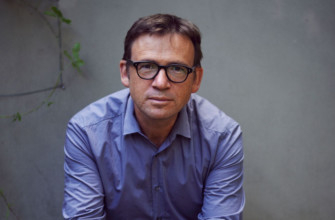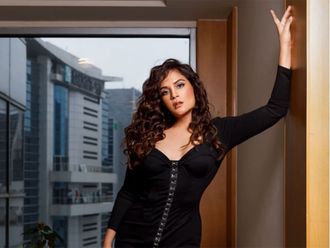
David Nicholls can do it all. He can, with effortless simplicity and magical readability, convey a marriage that has run its course but in which love endures, evoke the lifelong process of ageing in a few hundred pages, give people a voice — capturing the hopes and fears, and make a sensible grown-up sob.
Catapulted to literary fame with his 2009 novel “One Day”, which became an international bestseller and was adapted into a film, starring Anne Hathaway and Jim Sturgess, Nicholls has gone one step ahead with the follow-up, his latest “Us”, quite literally. Notwithstanding stress, the weight of expectations and a taxing five years, the bestselling author and screenwriter has outlasted them all with the tremendous success.
“I can’t imagine any publication being a casual affair,” he says, “It’s always fantastically exposing and nerve-wracking, torn between the pleasure of seeing the book on the shelf and anxiety at the thought that it might disappoint readers. So it was a long, rather fraught process. Still, given a choice, I’d rather follow up a success than a failure, and one of the benefits of ‘One Day’’s success was that it gave me a little time to make sure I got this one right.”
“Us”, his fourth novel, is about a mismatched middle-aged couple confronting the rot that has set in their marriage and their attempt to salvage it as their son prepares to leave for university. So when artist Connie tells scientist Douglas Peterson that it appears their marriage is all but over, he sees the Grand Tour of Europe they earlier planned for their 17-year-old son Albie, as an opportunity to win her back.
Nominated on the 2014 Man Booker Prize longlist, “Us” is a picaresque novel with knockabout humour and romance that fans and booksellers have waited with growing impatience. No wonder, even before its release, reports of a furious bidding war for the Hollywood film rights was already making the rounds, with Russell Crowe announcing his interest in playing Douglas. With all the brouhaha at the very high end, the British novelist says he is not yet ready to Americanise the Petersens.
“I’d like ‘Us’ to have some life as a book first and so I’m taking my time in making any decision. It’s a terribly difficult book to adapt — episodic, expensive, covering a huge amount of time and distance and it’s written in the first-person too, which is always a hard thing to get across in film as it is fundamentally a third-person form. But if someone can convince me that they can do it justice, then perhaps someday it will happen.”
Since its release in October, Nicholls was on an international publicity tour, travelling across the UK and then to the US, Italy, Sweden and Germany. In March, the journey will culminate with the Emirates Airline Festival of Literature. Though it will be a fleeting visit, barely 48 hours, Nicholls is looking forward to his time in Dubai.
“I loved my last visit, not so much for the shopping and the skyscrapers, more for the desert .... For a British person, the real thrill is to feel warm in March so I suspect any spare time will be spent by the swimming pool.”
Named UK author of year at the National Book Awards for “Us”, Nicholls encountered umpteen problems while writing it, even tossing away over 30,000 words in the bin. To spur him to greater productivity, he says, he even downloaded Write or Die, a software designed to concentrate authors’ minds, but it only exacerbated his difficulties.
“For the first time in my career I found that I couldn’t do the job I most wanted to do — write prose. I tried writing with pen, with pencil, lying down and standing up, working at dawn and at midnight, in libraries and cafés and at home. I spent 18 months pursuing the wrong idea, which I threw away in January 2013.”
He feels he has grown through this experience and that loss has produced gain. “It’s tempting to think of all of this as wasted time, but I suppose it’s more helpful — less disheartening — to think of it as part of the process. I couldn’t have written this without throwing away that. If I learnt anything, it’s that I’m not an improviser; writing fiction isn’t about accessing some part of the subconscious where a great story lurks. I need to know where I’m going, and I can’t write a story that I don’t already hold in my head.”
In between “One Day” and “Us”, Nicholls adapted Thomas Hardy’s “Tess of the d’Urbervilles” for the BBC and Charles Dickens’s “Great Expectations” — classics of unrequited passion and love gone wrong. He even adapted Hardy’s “Far from the Madding Crowd”, starring Carey Mulligan, to be released this year.
A big fan of Mulligan, Nicholls is hugely proud of the film. “It is both faithful to the novel and wildly different from the 1968 version, and indeed most traditional period dramas.”
Pretty rigorous about his working day, always fairly structured, Nicholls says the five years between the novels has been frenetic. “I don’t think there was a single day where I wasn’t busy. I worked on three produced movies, six hours of TV as well as all the book festivals and publicity tours for ‘One Day’.”
When it comes to big screen adaptations, Nicholls has a slightly different take, saying “adaptation” implies “change” and will always be a different experience to the solitary act of reading. There will always be an element of simplification, of wonderful moments or ideas that get lost along the way.
“In Dickens, for instance, the plots inevitably require condensing and some of the comedy — not always essential to the story, but ‘Dickensian’ nonetheless — will fail to make the final cut. Melodrama — an intrinsic part of Hardy — can be wonderful on the page, ridiculous on the screen, and there’s no real cinematic equivalent for the inner monologue or the unreliable narrator.”
Putting his hand over his heart, Nicholls, who wrote his first novel “Starter for Ten” in 2003, says he never writes a book with adaptation in mind, pondering if it will have another life and distorting a piece of prose to make it more “filmable”.
“I want the book to be a book, not a screenplay in disguise. At the same time, I love cinema and it’s a huge influence on my writing so inevitably I find myself thinking in terms of story, structure, character, performance, narrative tension and working out how to get from one scene to the next ....”
Even though some scenes in “Us” are inspired by true events, the author says it’s certainly not autobiographical. “It’s impossible to write something that you haven’t thought or felt or, perhaps in the case of ‘Us’, feared. But my personal life isn’t nearly as fraught or tense as the Petersens.”
In 2009, “One Day”, about the star-crossed lovers Dexter and Emma, he says, came out of the nostalgia that comes from turning 40.
Now 47, with a wife and children, Nicholls says, “‘Us’ couldn’t have been written if I hadn’t become a parent myself — but nevertheless it still remains a fantasy.”
Even though both “One Day” and “Us” have been the biggest tearjerkers of 2014, Nicholls claims when it comes to emotions he is “pretty steely”, except in certain moments.
“The final chorus in ‘I Say A Little Prayer’, Tom Waits singing ‘Somewhere’ ... the final pages of ‘Franny and Zooey’, the death of Magwitch in ‘Great Expectations’. Shirley Maclaine running down the street at the end of ‘The Apartment’ is also stirring.”
Notwithstanding his phenomenal success, Nicholls, who made a long attempt at building a career in acting, is in a love-hate relationship with what he does best — fiction and screenwriting. “When I’m in an eight-hour script meeting, being persuaded to do notes that I don’t agree with, then I fantasise about the solitude and control of writing fiction. If I’m alone in a room, stuck on the thirty-five thousandth word of a one-hundred and fifty thousand word novel, then I’d rather be almost anywhere else,” he says matter-of-factly.
While his work to date has mainly consisted of romantically minded tales, Nicholls says, on the contrary, he’s had always embraced the dark side — grief and loss, drug and alcohol abuse, loneliness, despair, unrequited longing, family hatred and humiliation — in his novels, though not explicitly identified.
Nicholls is taken aback when asked if he will break the norm in his next. “Whenever I finish writing a novel, I worry that it’s far too dark. At the same time, I have a tendency — perhaps it’s an English trait — to undercut anything that feels too fraught or sentimental, to make a joke in even the worst possible situation. I enjoy that sensation of comedy and tragedy rubbing up against one another. Perhaps next time I finish a novel; I’ll put a red line through all the irony, all the facetiousness and see what’s left. But would anyone want to read it?”
Suparna Dutt-D’Cunha is a writer based in Pune, India.
David Nicholls will take part in the Emirates Airline Festival of Literature to be held at InterContinental Hotel, Dubai Festival City, from March 3-7.
QUICK FIVE
Good time to write: 9am-1pm
A book or a personality that most influenced your life and work: “Great Expectations”.
A book you have written close to your heart: The lastest, “Us”,
A book you are reading now: “The Assistant” by Bernard Malamud, a very under-rated writer.
Your best and worst of times: Best, Paris, August 2003, writing my first novel. Worst; I don’t have particularly fond memories of school days.









